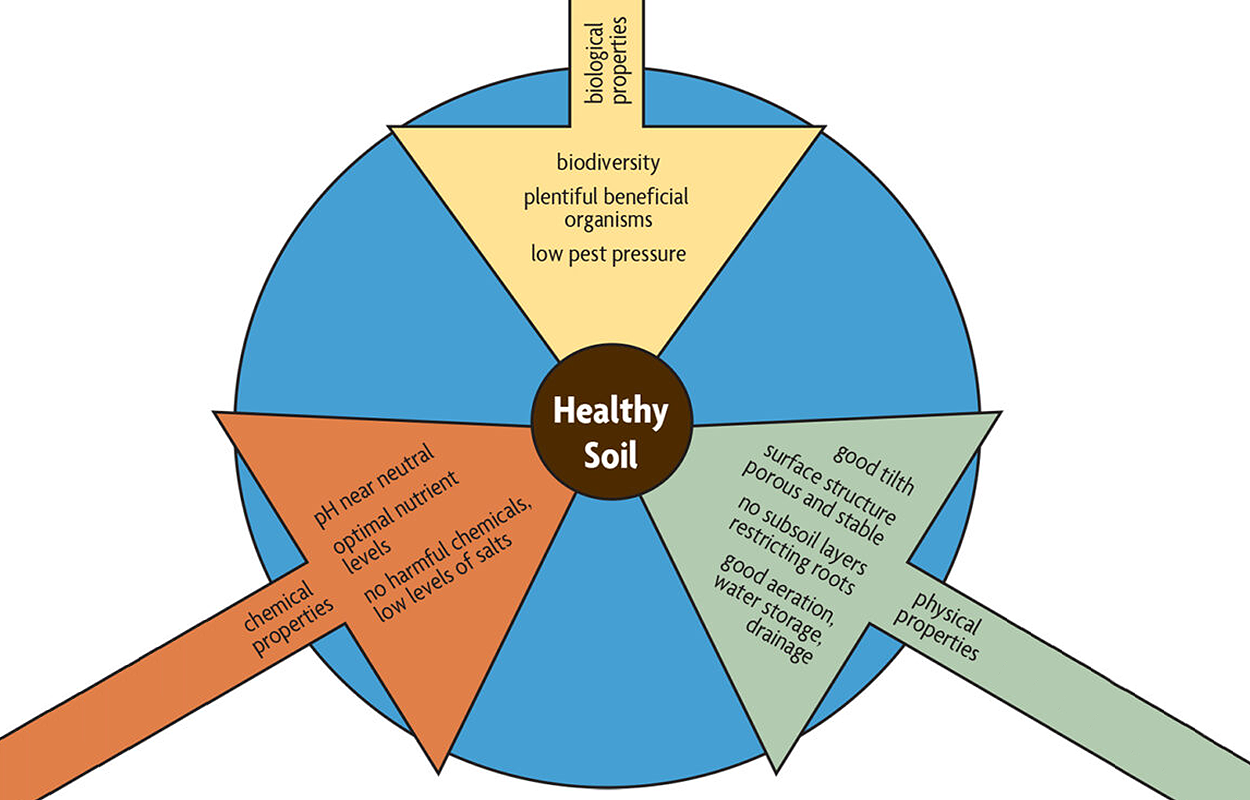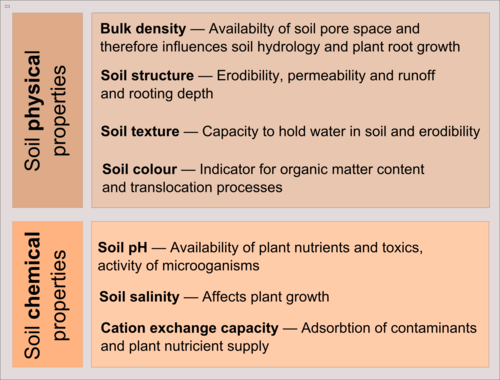Are you wondering which type of soil will truly boost your garden’s health and yield? Choosing between organic soil and chemical soil can feel confusing, but the right choice can make a huge difference for your plants—and for you.
Imagine growing stronger, healthier plants while caring for the environment and saving money in the long run. You’ll discover the powerful benefits of organic soil compared to chemical soil, helping you make a smart decision that supports your garden’s success and your peace of mind.
Keep reading to find out why organic soil might just be the game-changer your garden needs.

Credit: extension.sdstate.edu
Natural Nutrient Profile
Natural nutrient profiles in soil play a vital role in plant growth and health. Organic soil offers a balanced mix of nutrients. These nutrients release slowly, feeding plants over time. Chemical soils provide nutrients quickly but lack long-term benefits. Understanding the differences helps gardeners choose better soil options for their plants.
Organic Matter And Microorganisms
Organic soil contains rich organic matter like compost and decomposed plants. This matter improves soil texture and water retention. It also supports many helpful microorganisms. These tiny organisms break down organic material, releasing nutrients naturally. They create a healthy soil environment that supports plant roots and growth.
Microorganisms also protect plants from diseases. They help plants absorb nutrients more efficiently. This natural process keeps soil fertile without harmful side effects. Over time, organic soil becomes richer and more productive.
Chemical Additives And Their Effects
Chemical soils use synthetic fertilizers to add nutrients quickly. These chemicals provide an immediate nutrient boost for plants. But they often lack organic matter and beneficial microorganisms. Overuse can harm soil health by killing helpful microbes.
Chemical additives may cause nutrient imbalances. They can lead to soil acidification or salt buildup. These effects reduce soil fertility over time. Plants may become dependent on repeated chemical use. This cycle can weaken plant health and reduce crop quality.
Soil Health And Structure
Soil health and structure are key for strong plant growth. Healthy soil supports roots, holds nutrients, and helps water flow. Organic soil improves these qualities naturally. Chemical soil often harms soil life and structure. Understanding these effects helps gardeners choose the best soil type.
Impact On Soil Fertility
Organic soil adds natural nutrients slowly. It feeds plants and soil microbes. This keeps soil rich and alive. Chemical soil uses synthetic nutrients. These can harm beneficial microbes. Over time, chemical use can reduce soil fertility. Organic soil builds long-term fertility better.
Water Retention And Drainage
Organic soil holds water well. It keeps moisture available for plants longer. Its crumbly texture also lets air reach roots. Chemical soil often compacts and drains poorly. This can cause water to pool or dry out fast. Organic soil balances water retention and drainage effectively.
Plant Growth And Yield
Plant growth and yield depend heavily on the soil used. Organic soil and chemical soil affect plants differently. These differences show clearly in root development and crop quality and quantity. Understanding these effects helps growers choose the best soil type for better harvests.
Root Development
Organic soil supports stronger root systems. It contains natural nutrients and microbes that help roots grow deep and wide. Healthy roots absorb water and nutrients better, making plants more resilient. Chemical soil often lacks this natural support. It can lead to weaker roots and shallow growth. Over time, chemical use may harm soil life, reducing root health.
Crop Quality And Quantity
Organic soil usually produces higher quality crops. Fruits and vegetables grown organically often taste better and have more nutrients. Organic methods improve soil health, supporting steady crop yields year after year. Chemical soil may boost yields quickly but can reduce crop quality. Long-term chemical use can lower soil fertility, affecting future production. Choosing organic soil helps maintain both crop quality and quantity over time.
Environmental Impact
The environmental impact of soil choices matters greatly for our planet’s health. Organic soil and chemical soil affect nature in different ways. Understanding these effects helps us protect the earth and grow food safely.
Sustainability And Ecosystem Balance
Organic soil supports long-term soil health. It uses natural materials that nourish the earth. This helps plants grow strong without harming the environment. Organic soil encourages beneficial insects and microbes. These tiny creatures keep the ecosystem balanced. Chemical soil often harms these helpful organisms. It can disrupt nature’s cycle and reduce biodiversity.
Pollution And Soil Degradation
Chemical soil can cause pollution. Chemicals can seep into water and harm wildlife. Over time, chemical use can damage soil structure. This leads to less fertile land and erosion. Organic soil avoids these problems. It improves soil texture and water retention. Organic farming reduces the risk of harmful runoff. This keeps the soil clean and healthy for future use.
Long-term Benefits
Choosing the right soil affects your garden for many years. Organic soil offers benefits that build up over time. It supports healthy plants and a healthy earth. Chemical soil might show fast results but can harm soil in the long run. Understanding the long-term benefits helps you make smarter choices for your garden and environment.
Soil Regeneration
Organic soil helps the earth heal itself. It adds natural nutrients and improves soil texture. Tiny organisms in organic soil break down waste and enrich the ground. This process keeps the soil alive and fertile. Chemical soils often kill these helpful organisms. Over time, chemical use can make soil hard and lifeless. Organic soil supports a cycle that renews the land year after year.
Cost-effectiveness Over Time
Organic soil saves money in the long run. It reduces the need for extra fertilizers and pesticides. Healthy soil means healthier plants that resist pests naturally. Chemical soil might cost less at first but needs constant inputs. These extra costs add up over time. Organic soil lowers expenses by building strong soil and plants. It is a wise investment for gardeners who want lasting results.

Credit: www.yourgreenpal.com
Choosing The Right Soil
Choosing the right soil is crucial for healthy plants and a thriving garden. Organic and chemical soils offer different benefits and challenges. Understanding these differences helps in making the best choice for your garden’s needs.
Each soil type affects plant growth, soil health, and the environment differently. Selecting the right soil improves plant nutrition and reduces problems later.
Factors To Consider
Check soil quality before buying. Organic soil improves soil structure and supports microbes. Chemical soil provides quick nutrients but can harm beneficial organisms.
Consider plant type. Some plants prefer slow nutrient release from organic soil. Others may need fast-acting chemical nutrients.
Think about long-term effects. Organic soil builds fertility over time. Chemical soil may cause salt buildup and reduce soil health.
Best Practices For Application
Prepare the soil by removing weeds and debris. Spread soil evenly to avoid root damage. Mix organic soil well to enhance nutrients.
Apply chemical soil carefully, following package instructions. Avoid overuse to prevent plant stress and soil harm.
Water soil after application to help nutrients settle. Regularly test soil to monitor health and adjust care.

Credit: www.geo.fu-berlin.de
Frequently Asked Questions
What Are The Key Benefits Of Organic Soil?
Organic soil improves soil fertility naturally, boosts microbial activity, and enhances water retention. It supports sustainable farming and reduces chemical runoff, promoting healthier plant growth and long-term soil health.
How Does Chemical Soil Affect Plant Growth?
Chemical soil provides quick nutrient release, leading to rapid plant growth. However, it may harm beneficial microbes, reduce soil quality over time, and increase dependency on synthetic inputs, potentially causing environmental damage.
Is Organic Soil Better For The Environment?
Yes, organic soil is eco-friendly. It reduces pollution, enhances biodiversity, and prevents soil degradation. Organic practices promote sustainable ecosystems and lower carbon footprints compared to chemical fertilizers.
Can Chemical Soil Harm Human Health?
Excessive use of chemical soil can contaminate food and water. It may cause health issues due to pesticide residues and heavy metals, raising concerns about long-term exposure risks.
Conclusion
Organic soil supports healthy plants and protects the environment. It improves soil quality and keeps it alive with beneficial microbes. Chemical soil may act fast but can harm soil life and pollute water. Choosing organic soil helps grow stronger plants over time.
It reduces health risks for gardeners and consumers. Natural soil also stores carbon, helping fight climate change. Small changes in soil can make a big difference. Healthy soil means healthy food and a healthier planet. Consider organic soil for a safer, more sustainable garden.
